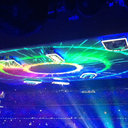Involvement of exogenous H2S in recovery of cardioprotection from ischemic post-conditioning via increase of autophagy in the aged hearts.
Atslēgvārdi
Abstrakts
BACKGROUND
Hydrogen sulfide (H2S), which is a member of the gasotransmitter family, plays an important physiological and pathological role in cardiovascular system. Ischemic post-conditioning (PC) provides myocardial protective effect in the young hearts but not in the aged hearts. Exogenous H2S restores PC-induced cardioprotection by inhibition of mitochondrial permeability transition pore (mPTP) in the aged hearts. However, whether H2S contributes to the recovery of PC-induced cardioprotection via up-regulation of autophagy in the aged hearts is unclear.
METHODS
The isolated aged rat hearts (24-months-old, 450-500g) and aged cardiomyocytes-induced by d-galactose were exposed to an ischemia/reperfusion (I/R) and PC protocol.
RESULTS
We found PC lost cardioprotection in the aged hearts and cardiomyocytes. NaHS (a H2S donor) significantly restored cardioprotection of PC through decreasing myocardial damage, infarct size, and apoptosis, improving cardiac function, increasing cell viability and autophagy in the aged hearts and cardiomyocytes. 3-MA (an autophagy inhibitor) abolished beneficial effect of NaHS in the aged hearts. In addition, in the aged cardiomyocytes, NaHS up-regulated AMPK/mTOR pathway, and the effect of NaHS on PC was similar to the overexpression of Atg 5, treatment of AICAR (an AMPK activator) or Rapamycin (a mTOR inhibitor, an autophagy activator), respectively.
CONCLUSIONS
These results suggest that exogenous H2S restores cardioprotection from PC by up-regulation of autophagy via activation of AMPK/mTOR pathway in the aged hearts and cardiomyocytes.



